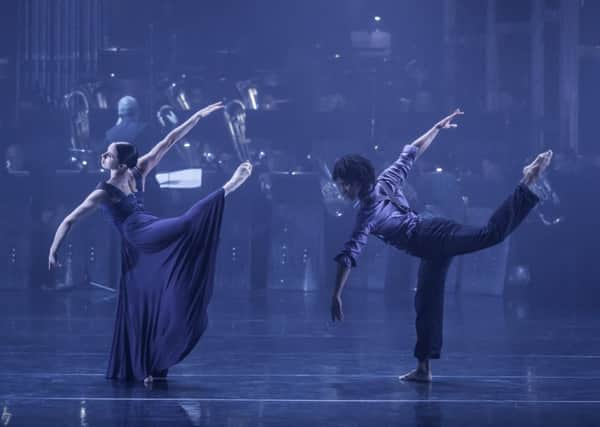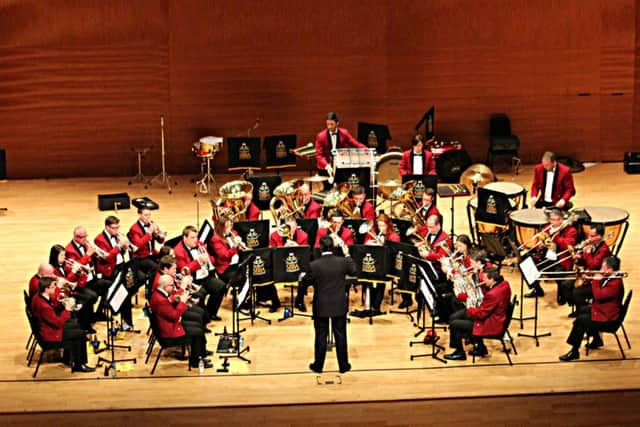Whitburn Band and Rambert Dance Company join for Miners’ Strike work


The sound hits you as soon as the door opens: a cacophony filled with promise, as cornets, horns, trombones and tubas are warmed up ready for the night’s work. But by far the biggest noise at Whitburn Band Hall on this dark Sunday evening comes from the piano, groaning under the weight of the silverware sitting on top of it.
Whitburn Band, 18-time Scottish brass band champions and ranked 13th in the world, is no stranger to trophies. Every available space on the piano is taken up with cups and awards and the walls are adorned with photographs and accolades of the band’s rich heritage. Their rehearsal venue may be new – an industrial estate unit near Bathgate in West Lothian – but this former colliery band is steeped in history dating back to 1870.
Advertisement
Hide AdWarm-up finished, the musicians assemble ready for the challenge ahead. And tonight, it really is a challenge. Putting their usual repertoire of harmonious tunes and competition pieces to one side, Whitburn has agreed to accompany Rambert Dance Company on its upcoming visit to Edinburgh.


Choreographed by Rambert’s artistic director, Mark Baldwin, Dark Arteries is a new work inspired by the Miners’ Strike which rocked communities and dominated headlines during 1984 and 1985.
The music, created by young British composer Gavin Higgins, will be played by a different brass band at each venue on Rambert’s UK tour. A dark contemporary piece in three movements, Higgins’ composition is a far cry from Whitburn’s usual output.
“It’s a very abstract work,” says trombonist and band manager, Charlie Farren, “and the music is quite intense. Which is good for the individual players, as you have to be very disciplined playing your own part, because no two parts are the same.”
Like the rest of the band, Farren has a day job – Whitburn Band is his extra-curricular passion. Twice a week (and every night in the lead-up to competitions) the band meets to rehearse, many of them travelling for miles to attend. A myriad of careers sits before me as the band strikes up: several teachers, a train driver, a journalist, a garage worker, a hairdresser. Levels of training differ, but the skill they all exhibit is remarkable.
Higgins’ piece may be unusual, but it’s well within their grasp, even if it’s not to everyone’s taste.
Advertisement
Hide Ad“All the guys who are conservatoire trained love it, because it takes them back to what they learned,” says Farren, who himself studied at the former RSAMD in Glasgow. “Personally, I think it’s fantastic, and the two guys who sit next to me are at the Royal Conservatoire of Scotland at the moment, and they say it’s right up their street.
“But if you ask some of our traditional banders, they’re not so sure. So it’s a challenge in different ways for every player.”
Advertisement
Hide AdHiggins was inspired to write the piece, and encouraged Baldwin to choreograph it, due to the pit closures which affected his own family. None of the players currently with Whitburn Band worked in the nearby mines, but does a piece like this still have emotional resonance for them?
“It does for me personally,” says Farren. “I grew up in the town, and played with the band at the gala day every year from the age of 12. I remember the pit closing and the turmoil the town went through. British Leyland shut down at pretty much the same time, just down the road in Bathgate.
“There used to be a vibrancy around the town and all the shops were busy – but it never recovered, and neither did some of the people who worked in the pits. It had a deep impact on the town and the surrounding area.”
One thing which has survived in many of the former pit communities across the UK is the bands – which is the reason both Higgins and Baldwin wanted to create Dark Arteries.
“I never thought I’d be choreographing a piece about the Miners’ Strike,” says Baldwin. “But Gavin Higgins’ family all play in the same brass band, have done for several generations, and they were miners before that – so it was his idea.
“Gavin is so fired up by the fact that everything was destroyed in those communities – all they have left is the band. But those bands are still going, they feed all the big orchestras, they give lessons – there are all these things that keep that tradition alive. And now he’s written this new piece for them.”
Advertisement
Hide AdAs it works its way across the UK, Rambert has enlisted the help of some of the finest brass bands in the land, including Carlton Main and Frickley Colliery Band from Yorkshire, Tredegar Town Band from South Wales, and Fairey Brass Band from Stockport – all champions, many times over.
For Baldwin, not only is it a direct link with local communities affected by the Miners’ Strike, but it’s good for audience engagement and perhaps enticing newcomers to dance. With 21 dancers and 30-35 brass band players sharing a stage, it’s an exciting introduction to contemporary dance.
Advertisement
Hide Ad“We did another project similar to this in 2008, when we used local choirs to sing a piece by Howard Goodall,” explains Baldwin. “And that felt like a really good way to do something with local people on the tour. So I was keen to find something else like that, because it’s amazing the different types of audience you can get if you do.”
A work in three sections, Dark Arteries reflects life underground before the pits closed, the anguish of the picket line, and the brass band legacy left behind. All of which is echoed in Higgins’ music.
“There’s something magical about the brass band sound,” says Baldwin. “But what Gavin wanted to do was push it away from Victorian oom pah pah and bring it right up to date – which he’s managed to do in spades. So you get the idea of being underground, of landscapes intersected with industrial machinery. It’s an amazing piece of music.”
• Rambert Dance Company: Dark Arteries, Edinburgh Festival Theatre, 26-28 November